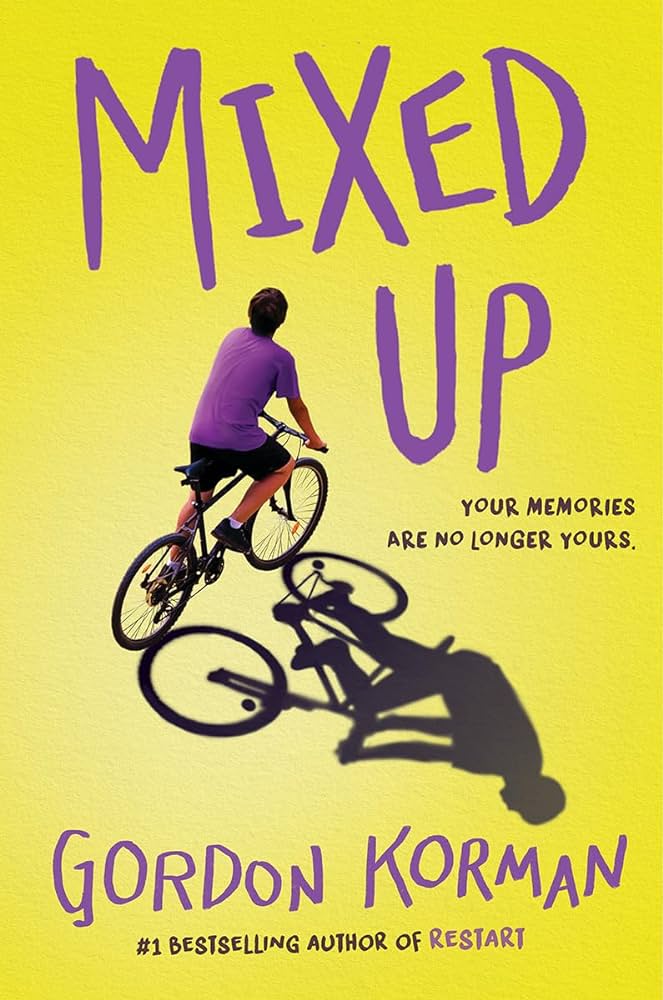Mixed Up

Mixed Up
The premise of this novel is totally ridiculous – and author Gordon Korman pulls it off entirely, with full hilarity and finesse.
Told in first-person by two alternating (every other chapter) characters, Mixed Up is contemporary, fun, and action-packed. The genre is humor and magic realism, served up with wallops of tension and a hint of romance.
Twelve-year-olds Theo and Reef are entirely different in personality and circumstances, live on opposite ends of town, and attend two different middle schools. They’d have no reason to ever meet, let alone work together on a super-weird project, if they weren’t losing memories to each other in a quirky, totally mystifying “Phenomenon”. Of course, no one will believe them, let alone approve their wacky scientific theory as to how to reverse matters.
Theo looks shocked for a moment and then breaks into a nervous laugh. “You really are the right guy. Makes sense, I guess. If I’ve got your memories, why shouldn’t you have mine?”
“Is this, like, a disease?” I wonder. “We both got sick, and now our brains are…switching heads?”
“Not our brains. I’m still me and you’re still you. But I remember your life like I’m the guy who lived it. And vice versa.” —Reef
Theo (who is obsessed with gardening) clashes with his dad who wants him to “man-up” more in the sports, friends, and pranks department. Reef is suffering from the loss of his mother and guilt over being the indirect cause of her death, as well as the bullying of his resentful roommate who is his foster family’s youngest son.
Add in a bad guy, a cranky principal, and competition over a super popular girl, and you have all the ingredients for high-stakes ups and downs, clashes, scary scenes, and misunderstandings. The pace never lets up, and the characters are fully drawn and believable. Their clumsy ways of pursuing the truth and concocting a solution to their bizarre brain-drains is—once you accept the premise—entertaining and pure middle-school.
The dialogue chimes in with the novel’s high-quality humour, and the characters and language throughout are consistent with the target age group. No “secondary” characters are wasted; they all come together in the climax. And many of the metaphors are prize-winners.
I prefer to think of myself as a very long-term houseguest who’s going to move out of here and go someplace else—any place else—as soon as I can. And however much I want that, multiply it by a thousand and you’ve got Declan. Here he was, the baby of the family, and along comes some poor orphan who’s two years younger, with a sob story that would melt an iceberg. Presto, he has to share his room with the interloper. —Reef
I can’t help reflecting that nothing I do is ever going to generate this much enthusiasm from our father. Not even if I grow a prize pumpkin that outweighs a Mini Cooper at the county fair. – Theo
For a shy kid like me to be thrust into a bustling crowd of strangers who all know each other is the definition of uncomfortable. I buy myself a small cone and hide behind it as best I can, but everybody seems to want to know who is this outsider who’s suddenly friends with Portia. My usual companions—green peppers and daisies—are satisfied with water and a little fertilizer now and again. Middle schoolers, not so much. It only makes it weirder that so many of these kids are familiar. At one point, I actually smear fro-yo on my chin so I can disappear behind a napkin for a while. —Theo
Best of all, the changes in both Theo and Reef at the end feel authentic and satisfying, with no corniness in sight. Well, no more corniness than the reader secretly wants (and expects from a Gordon Korman novel).
As for the premise? Sigh. It shouldn’t, but it works. Totally.
Pam Withers is an award-winning author of more than 20 young-adult adventure novels, including Mountain Runaways. She lives in Vancouver, British Columbia, and is founder of www.YAdudebooks.ca.
